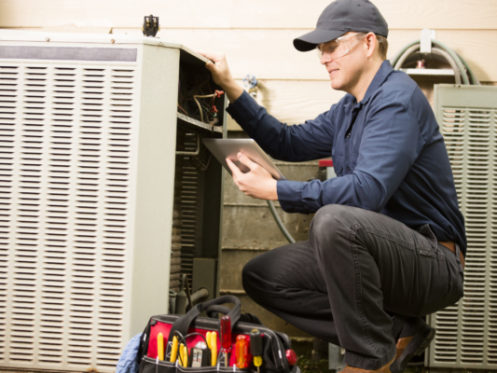A furnace is a crucial heating appliance widely used in residential, commercial, and industrial settings. Operating on the principle of controlled combustion, it generates heat by burning fuel, usually natural gas, oil, or coal. The combustion process takes place within a sealed chamber, where the fuel reacts with air to release energy in the form of heat. This heat is then distributed through a network of ducts or pipes to various spaces, providing warmth and comfort during colder periods. The furnace’s intricate system includes components such as burners, heat exchangers, and blower fans, which collaborate to ensure efficient heat production and distribution.
Why You Should Install a Furnace
Installing a furnace in your home offers numerous compelling reasons to enhance both your comfort and energy efficiency. One of the primary advantages is the consistent warmth it provides during colder months. A furnace efficiently heats the air, distributing it evenly throughout your living spaces, ensuring you stay cozy regardless of the outdoor temperature. This reliable heat source is particularly crucial for individuals living in regions with harsh winters, where maintaining a comfortable indoor environment is paramount for overall well-being.
Moreover, modern furnaces are designed with energy efficiency in mind. Newer models incorporate advanced technologies that optimize fuel consumption and reduce energy wastage. By upgrading to a high-efficiency furnace, you can significantly lower your energy bills while also reducing your carbon footprint. Many contemporary furnaces are equipped with programmable thermostats, allowing you to set customized heating schedules that align with your daily routines. This not only helps maintain a comfortable atmosphere but also ensures that energy is used judiciously, minimizing unnecessary heating during times when you’re away from home.
Beyond comfort and efficiency, installing a furnace can positively affect your health. Furnaces play a crucial role in maintaining indoor air quality. They are equipped with filters that trap dust, allergens, and pollutants, preventing them from circulating throughout your home. This is especially beneficial for individuals with allergies or respiratory issues, as clean air contributes to better health and well-being.
Different Types of Furnaces
One common type is the gas furnace, which relies on natural gas combustion to generate heat. Gas furnaces are known for their efficiency and relatively lower operational costs compared to other options. They distribute warm air through ductwork, ensuring even heating throughout the home. On the other hand, oil furnaces use heating oil to produce heat, making them a suitable choice for areas where natural gas is less accessible. While oil furnaces can be efficient, they generally require more maintenance and produce more emissions compared to their gas counterparts.
Electric furnaces, another type, utilize electrical resistance to generate heat. They are simple to install and do not require fuel storage, making them a viable option for regions where electricity is cost-effective. However, they might be less efficient and more expensive to operate in the long run, especially in areas with high electricity costs.
What to Consider When Choosing a Furnace
Selecting the right furnace for your home involves a thoughtful assessment of several crucial factors. First and foremost, consider the energy efficiency of the furnace. Look for models with high Annual Fuel Utilization Efficiency (AFUE) ratings, as this indicates how effectively the furnace converts fuel into heat. Higher AFUE ratings translate to lower energy consumption and reduced utility bills over time. Additionally, the type of fuel available in your area plays a significant role in your decision-making. Gas furnaces are common and often cost-effective, while oil furnaces might be necessary in regions without natural gas access. Electric furnaces are straightforward to install, but the cost of electricity should be factored in.
The size of the furnace is another vital consideration. An oversized furnace may result in frequent cycling on and off, leading to energy waste and uneven heating. Conversely, an undersized furnace will struggle to adequately heat your home. To determine the appropriate size, enlist the help of our professional technicians who can perform a load calculation based on factors like your home’s square footage, insulation, and climate. Compatibility with your existing ductwork is also essential. A well-designed duct system ensures efficient airflow and even distribution of heated air throughout your home.
Additionally, noise levels can impact your comfort, so opt for furnaces with lower noise ratings to avoid unnecessary disruptions. When evaluating options, investigate the available features such as programmable thermostats, variable-speed blowers, and zoning systems. These can enhance your control over indoor comfort and energy consumption.
Why You Should Consult With HVAC Professionals
First and foremost, the safety of your home and its occupants should never be compromised. Improperly installed or maintained furnaces can pose significant health and safety risks, including carbon monoxide leaks and fire hazards. [Company_name] professionals are well-versed in industry standards and regulations, ensuring that your furnace is installed correctly and operates safely. They can also assess ventilation and exhaust systems, crucial components for expelling potentially harmful combustion byproducts from your home.
Furthermore, our professionals have the expertise to optimize the efficiency of your furnace, which directly impacts both your energy bills and your environmental footprint. They can evaluate your home’s insulation, ductwork, and overall heating needs, determining the right furnace size and configuration for optimal performance. Incorrectly sized furnaces can lead to energy wastage and discomfort due to uneven heating.
Moreover, with experience in delivering exceptional furnace installation, repair, and maintenance services, Cool Power LLC is the reliable choice for residents in RONKONKOMA and its surrounding areas. Finally, our professionals have access to the necessary tools to complete the installation properly and efficiently.
How to Take Care of Your Newly Installed Furnace
To begin with, create a clear space around your furnace. Ensure that no objects can obstruct the airflow and that the area is free from dust and debris. Adequate airflow helps your furnace operate efficiently and prevents overheating. If you notice any unusual noises, odors, or a decrease in heating performance, don’t hesitate to contact a professional technician for immediate attention. Taking these simple yet effective steps will go a long way in maintaining the functionality and efficiency of your newly installed furnace, providing you with reliable warmth for years to come.
Secondly, regular maintenance is key. Schedule inspections with Cool Power LLC at least once a year, ideally before the start of the heating season. Our technicians can check for any potential issues, clean components, and ensure everything is functioning efficiently. Additionally, remember to replace air filters regularly. Clogged filters can strain your furnace, reduce its efficiency, and even lead to poor indoor air quality. A general rule of thumb is to replace disposable filters every one to three months, but it’s good to check them monthly, especially during heavy use.
In addition to top-notch furnace services, we also offer a comprehensive range of solutions to enhance your home’s comfort. Our expertise extends beyond furnaces to include air conditioning, ensuring you stay cool during the hottest months. We also prioritize indoor air quality, providing solutions for a healthier living environment. Count on us for a complete suite of services that cater to all your heating, cooling, and air quality needs.
Contact Cool Power LLC today to learn more about us and our services.


